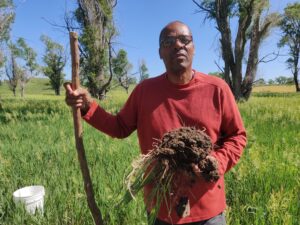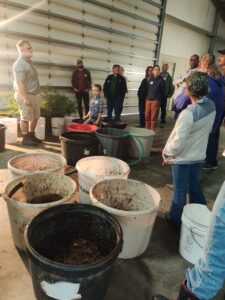Progress report for SW23-952
Project Information
Regenerative Agriculture (RA) producers advocate for their systems-based approach to improving soil health, biodiversity and ecosystem functions from coffee shop conversations to conference panels. Yet there are important challenges to RA implementation in semi-arid environments often missing from these stories. In this project we will integrate producer-led on-farm research and outreach to develop a comprehensive understanding of the linkages between soil health practices and indicators, net profitability, and barriers to adoption for Historically Underserved (HU) producers. Importantly, we will build tools and capacity for producers to document and analyze the outcomes of their RA experiments.
We will accomplish these goals through biophysical and sociological research. Using data from an existing network of 30 farms across the Central High Plains coupled with participatory research on 8 farms, we will identify soil health indicators most relevant to informing the outcomes of on-farm RA experiments in semi-arid environments (Objective 1). We will engage a broader group of producers that represent diverse scales, backgrounds, and production systems through qualitative research and outreach. HU producers have important RA success stories to share, however they face systemic barriers to accessing resources and support. We will define key barriers, best practices and effective strategies to support HU producers in adopting or scaling up soil health practices (Objective 2).
Previous research and partnerships with producers across this multi-state region informed our education and outreach objectives. Producers are experimentalists, constantly testing new approaches and sharing the outcomes of these tests via producer-to-producer networks. Through our participatory research approach we will co-design and quantify the outcomes of RA experiments (Objective 1) while using iterative feedback to create a tool for producers to document, analyze, and communicate the outcomes of their RA experimentation (Objective 3). RA producers report feeling isolated and “groping in the dark'' because they have limited regional data on the agronomic or economic viability of RA practices. We will address this need by facilitating in-person educational events and producer-to-producer learning networks. This will include creating individual connections, enrollment in innovative online networking tools, and field days at diverse farming operations across three states (Objective 4). These networks will ensure that these impacts persist beyond the project funding timeline.
One key challenge to increasing adoption of RA systems is the need to adapt to the local context, including the social, environmental and economic context of the producer. This project addresses this challenge by empowering producers to design, conduct, document, and share their on-farm experiments. The resulting data and case studies will bolster their discussions with stakeholders including landlords, bankers, family members, and build a local, field-scale body of evidence for RA practices.
In addition, we will identify and communicate programmatic, policy, soil health testing, and educational barriers to the adoption of RA practices. These efforts will enhance the adoption of RA practices across diverse farm types, with an emphasis on HU producers, build stronger farmer-to-farmer learning networks, and create new approaches and policies to support all producers.
Objective 1: Identify soil health indicators that are most relevant for informing and quantifying outcomes of on-farm soil health experiments in semi-arid cropping systems.
Objective 2: Identify systemic barriers, best practices, and effective support strategies for historically underserved producers to adopt or scale up soil health practices.
Objective 3: Create a mechanism for producers to easily quantify and communicate the results of their soil health experimentation.
Objective 4: Facilitate producer-to-producer learning networks and knowledge sharing using innovative online and in-person educational tools and programs.
Cooperators
- - Producer
- - Producer
- - Producer
- - Producer
- - Producer
- (Researcher)
- - Producer
- - Producer
- - Producer
- - Producer
- - Producer
- - Producer
- - Producer
Research
Objective 1: Identify soil health indicators that are most relevant for informing and quantifying outcomes of on-farm soil health experiments in semi-arid cropping systems.
- Identify fields and characterize the soils
-
We used a participatory research approach through which producers identified their resource concern for one field using management history and baseline soil health information. Together we co-designed an on-farm experiment to evaluate management strategies to address that concern.
-
We have 13 participants (representing 10 farming operations). For each field, we divided each treatment and control area into 3 zones based on soil type, field layout, and/or management history. From each zone, we collected and composited soil from the top 15cm in May and June of 2024. One farm was added, and one was skipped in Y1 due to access issues. All soils were analyzed for soil texture, bulk density, a commercial Soil Health Assessment and a ‘minimum set of indicators’ from the North American Project to Evaluate Soil Health Measurements (Soil Health Institute). The lab-analyzed soil variables include: traditional chemically-extractable soil nutrients, soil organic matter and soil organic carbon, the fractions of carbon in POM and MAOM, pH, water-extractable carbon and nitrogen, and soil aggregate stability. We co-produced the soil testing protocol for the summer, and added items to the testing list based on producer feedback: assays for biological soil health, and fertilizer recommendations informed by biological activity.
-
The commercial lab’s test results were provided back to producers in July, and university lab results were provided in December. These were in a user-friendly format that provided regional benchmarking for users, so they could have some context to interpret their results with. See attachments.
-
-
New to the project this year is the evaluation of an in-field measure of soil health: the Tea Bag Index
-
Based on our conversations with producers, our goal is to find a soil health indicator that is responsive and accessible enough to enable them to run field trials and answer their own research questions. This indicator should have single-season sensitivity to management changes, to quantify the effects of the practices they’re trying each year. It also needs to be accessible: low-cost, low labor, and with low capital expenditure on equipment. We are doing a lab incubation experiment to refine the methods of the Tea Bag Index, and quantify its signal-to-noise ratio in semi-arid soils. Does it pick up on management changes in these soils? Could a producer reasonably design a statistically powerful experiment?
-
Our approach to adapting the Tea Bag Index to our semi-arid context: We are evaluating 4 types of tea (green, rooibos, mint, and black) and 2 types of cotton (cloth and balls, both unbleached). We are finding alternatives for laboratory-grade balance and muffle furnace. Previous research on the Tea Bag Index struggled to adapt when manufacturers kept changing the materials of the tea bag, and so we are evaluating the effect of just re-bagging the tea in readily available 200um nylon mesh pockets. While leaching is the first step of decomposition, we believe that this weakens the “soil health” signal, since it will be greatly influenced by soil moisture at the time of installation. In mesic soils, such as the European soils where this index was developed, this is less of an issue. For adapting the Tea Bag Index to semi-arid soils, we are exploring the effects of pre-leaching the tea to remove most of the leachable fraction. We will set up full-factorial experiments with 3 replicates to evaluate the effects of these variables. We will use soil from the nearby experiment station, adjusted to 10-30%VWC. We will use ANOVA to evaluate the effects of these changes, and characterize their variability.
-
-
Slakes app – existing soil health tool designed for producers
-
We evaluated the suitability of an existing in-field, user-friendly soil health evaluation: the Slakes app. In Y1, we used the app on air-dried soils in the lab on a tracing tablet, to get a best-case dataset to estimate aggregate stability. Next summer we will use this method in the field, to see how it performs with the additional variability of being in-field (inconsistent lighting conditions, field-wet soils, etc).
-
Objective 2: Identify systemic barriers, best practices, and effective support strategies for historically underserved producers to adopt or scale up soil health practices.
- Literature review
- Land tenure is a prerequisite for soil health work. Without an operation of one's own, the capital to invest in new equipment, and the capital to endure failed experiments, one cannot work on soil health. While researching RA practices amongst HU producers, we were struck by the magnitude of the land loss experienced by Black producers, as compared to their white counterparts enduring the same challenges (Dust Bowl, Get Big or Get Out, capital intensification in farming). We used this literature review to understand the patterns of land loss among Black producers since the 1910's, discovering which of those patterns were specific to the South, and which were also at work in Kansas.
- Semi-structured interviews
- We used qualitative, semistructured, ethnographic interview methodology to obtain the stories, concerns, and practices of five BIPOC participating farmers. Participant selection criteria included: 1) participants are actively farming as an economic business; and 2) participants consent to the study purpose and goals. Five beginning and Black farmers were interviewed in October 2024. Interviews utilized open-ended questions to gain a deeper understanding of systemic barriers to RA practice adoption for HU producers. Interview topics included Knowledge, Awareness, Education, and Practices. All interviews were recorded with the permission of interviewees, transcribed, and reviewed by the interviewer. We used thematic analysis, and coded the interview data to draw out recurring themes. Dr. Freeman wrote a white paper and developed a video to summarize the findings and next steps. We plan to distribute these to our broader networks in the coming months. Human subjects research protocols were reviewed by the Office of Research Integrity at Colorado State University.
- Veryl Switzer/KSU MANRRS AG Camp for Youth 2023: Data Analysis
-
Since 2007, KBFA has hosted the annual Nicodemus Educational Camp for mostly urban students aged 10-17. The 4-day camp introduces Black youth to agriculture, helps them understand that agriculture touches every aspect of their lives, and helps them explore all the opportunities therein. This camp showcases agricultural careers including jobs and scholarships, and opportunities to visit with Minorities in Agriculture, Natural Resources, and Related Sciences college students.
-
We collaborated with KBFA and KSU in analyzing results of pre- and post-assessment surveys for the 2023 camp, using multivariate factor analysis to reduce the 16 variables (survey questions) to just a few interpretable factors. We provided a white paper to KBFA with an interpretation of the results to help improve the program and identify opportunities to support and engage African American youth in agricultural programs more broadly. Human subjects research protocols were reviewed by the Office of Research Integrity at Kansas State University.
-
Objective 1: Identify soil health indicators that are most relevant for informing and quantifying outcomes of on-farm soil health experiments in semi-arid cropping systems.
- Soil health testing results
- We had strong soil texture and longitude gradients across the 10 field sites. From our principle components analysis, we found that several of the measures of soil health as well as the overall Ward Lab soil health score were highly correlated with texture, which makes them less useful for farmers who want to use these tests to help them make management decisions. However, mineral associated organic matter carbon (MAOM C), in particular, as well as water extractable C and aggregate stability were less sensitive to texture. Thus, these metrics may be potentially more useful and responsive to management than other metrics in our region.
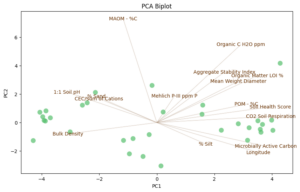
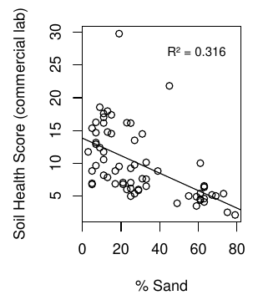
- Farmers’ research needs vs. publishable research in academia
-
We also are exploring the disconnect between farmers’ own research questions, and the work that would be considered “publishable” in academia. For instance, one of the farmers wants to know what better use he could put his field to, considering his neighbor dumps his cattle carcasses on his land. His questions are centered around remediating the soil: “What happened to my soil under these carcasses? How bad is it? How do I fix it?”
-
-
-
The data shows trends that we would expect (high nitrates, sodium, and phosphorus); this is not novel. In addition, this situation doesn’t allow for replication: there are no nearby white farmers with this same issue, so we can’t expand our study to include more sites. This is not a publishable result, and he still wants to know what to do to repair the soil under the carcasses.
-

-
-
With support from the Kansas Black Farmer’s Association and other groups, he was able to confront the farmer, get the carcasses removed, and hopefully prevent further dumping. He’s currently letting the land rest and letting precipitation draw the nitrates deeper into the soil profile, and he’ll evaluate next steps after the next soil sampling.
-
-
Slakes app evaluation results
-
We found that the Slakes data correlated with the wet sieve lab method fairly well (R2 = 0.46), much better than the commercial lab’s Water Stable Aggregates (Modified) method (R2 = 0.27).
-
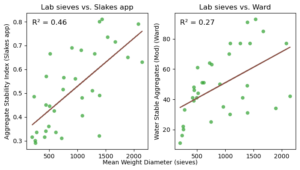
Objective 2: Identify systemic barriers, best practices, and effective support strategies for historically underserved producers to adopt or scale up soil health practices.
- Literature review
- We found that the two main drivers of Black land loss were racism at the USDA (see USDA's Civil Rights Implementation reports), and exploitation of heirs property. We explored the ways in which the Kansas Black Farmers Association and Nicodemus, the most prominent all-Black settlement in the West, impacted those patterns, and recent efforts by KBFA and the legislature to combat this issue and rebuild Black land ownership at rates on par with what demographics would suggest.
- Beginning & Black Farmers and Regenerative Ag interviews
-
The interviews and analysis are complete (see the attached full report). This study explores the intersection of regenerative agriculture and beginning, Black farmers through interviews and a review of recent literature on sustainable farming practices. Findings reveal that while farmers recognize the importance of soil health, many face obstacles in accessing the education and resources needed to implement regenerative practices.
-
- Veryl Switzer/KSU MANRRS AG Camp for Youth Data Analysis
- From our analysis of the summer camp survey data, we found trends of youth feeling inspired to farm, and feeling excluded from AgSci. In general, Black women and older youths scored higher on feeling excluded, and lower on inspiration to be in AgSci. This demographic haven’t been welcomed in the AgSci world historically, either by USDA policy or other farmers, and the feelings of exclusion generated by these realities are going to be tough to address. This camp does a great job of showcasing and celebrating many great examples of successful Black AgSci professionals, which will hopefully address these feelings of exclusion. See the full report here: https://farmsproject.org/wp-content/uploads/2025/04/SwitzerKSUcamp_likert_final-1.pdf
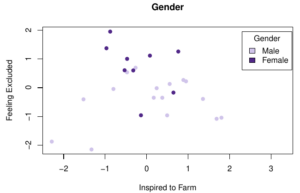
Research outcomes
We identified a need for an in-field, farmer-friendly, accessible and responsive soil health test. This would enable farmers to evaluate the effects of the soil health management decisions that they are making. We identified the tea bag index as possible to address this need, and are exploring its capabilities.
As a result of our interviews and data analyses with Black farmers, we identified that educational resources, financial incentives, and market structures need to align to support this transition. For Black, beginner farmers, particularly those in Kansas, this study highlights the need for targeted outreach programs to help them understand and implement regenerative practices effectively.
Education and Outreach
Participation summary:
Objective 3: Create a mechanism for producers to easily quantify and communicate the results of their soil health experimentation.
- Define requirements and build app
- Our team wrote an app using the Python programming language to help producers run their own on-farm experimentation, track outcomes and generate case studies reports. All of the collaborating producers engaged in the Objective 1 on-farm research are included in testing the app and providing feedback.
- We will evaluate the success of this objective using the WSARE survey instrument with some additional questions. We will survey each producer twice: one month after their experiment begins, and after their first case study is finished (or after 3 months of inactivity). We will gauge producer interest, comfort with the app interface, and sharing behaviors of the case studies.
Objective 4: Facilitate producer-to-producer learning networks and knowledge sharing using innovative online and in-person educational tools and programs.
-
Facilitate producer networking; 1-to-1 support
-
Based on producer input, we have identified a need for facilitating producer-to-producer networks and information sharing. We are facilitating education and outreach through many channels: in-person annual field days, online webinars and get-togethers, 1-to-1 support within this network and with external partners, and magazine publications.
-
Objective 3: Create a mechanism for producers to easily quantify and communicate the results of their soil health experimentation.
- Define requirements & build alpha version
- The alpha version of the app was tested by project staff (Meagan Schipanski, Joni Mitchek). We did a short cycle of app updates to fix the bugs they found.
- Beta version
- The beta version of the app is complete and has been launched. All producers who are comfortable with internet apps have been on-boarded. They have designed their soil health experiments, selected the location and size of their test and control plots, and have input their project schedules. Most experiments start in April or May, so the app will soon start pinging producers to input their observations and results.
- A static demo of the app is available. Here is an example of the data that could be collected in the app. From that starting point, the producer and our project staff can sit down and write this fact sheet together.
Objective 4: Facilitate producer-to-producer learning networks and knowledge sharing using innovative online and in-person educational tools and programs.
-
Field day
-
In collaboration with CCTA (Mitchek) and Extension (Meyer), we hosted the Y1 field day at Curtis Sayles’ farm in Seibert, CO. We invited Doug Steffen (Crofton, NE) as the guest speaker. We had a hands-on compost pile build and microscopy event. Participants brought samples of their compost, and they analyzed them using several microscopes from CSU. Facilitators helped interpret the microbes that were found. We had 15 participants who filled out the WSARE survey instrument, plus 7 kids. 8 participants were farmers, 3 from government, and 2 from the nonprofit sector. 100% said they gained knowledge from the workshop, and would use that knowledge. In total, the participants estimated that they would share this information with 182-294 other people. The kids were especially helpful in prepping the compost pile materials before the workshop.
-
-
Facilitate producer networking; 1-to-1 support
- Facilitated farmer networking. We have connected new collaborating producers involved in this WSARE project with producers that are part of our previous FARMS farmer-to-farmer network.
-
Due to demand, we increased the number of producer-to-producer webinars to monthly during the winter months (Dec-March). In March, we invited Jim Williams from South Dakota to speak about compost and compost extract, and the ways he’s implementing these on his farm.
- KBFA have collaborated closely with two farmers to facilitate evaluations of their land by both NRCS and Nutrien, with a focus on crop planning and compost development. These same farmers have also submitted applications for High Tunnel systems to extend their growing seasons and enhance soil health. Moreover, they recently completed the Farm Viability Fund mini-grant process through KBFA’s Land Access, Marketing, and Capital grant, which will improve operational sustainability. We are especially proud to share that one farm couple has now achieved both GAP and FSMA certification. With these credentials, they are eligible to participate as producers in our Sodexo Magic and FreshPoint Marketing program, where they will sell their produce directly to institutional buyers.
-
Publications
-
This field day and several of the members of our team were featured in the cover article “GROUND LEVEL: Examining soil health as a key to successful farming and environmental well-being,” in the STATE magazine. Two participating farmers, Stu McFarland and Curtis Sayles were featured, as well as the CSU soil health team.
-
Dr Holmes recently published an op-ed in Civil Eats, "Black Producers Have Farmed Sustainably in Kansas for Generations. Let’s Not Erase Our Progress." She discusses KBFA’s commitment to regenerative agriculture practices and highlights the practical approaches they've adopted across the KBFA farming network.
-
Project press release, and the press release for the field day, was published in multiple news outlets
- We launched our project website, hosted on the FARMS Project's website: https://farmsproject.org/wsare/
-
- 8 invited presentations:
- Schipanski, M. ‘Conserving soil and water resources in semi-arid regions’ at the UN FAO World Soil Day Celebration, New York, NY. December 7, 2023.
- Presented at Colorado Conservation Tillage Association's High Plains No Till pre-conference FARMS Workshop, Burlington CO, Feb 5, 2024. Lauren Hafford and Joni Mitchek
- Hafford, L. “Soil Health on the Farm.” Flower Hill Institute: AgriCULTURE meeting, online webinar, February 21, 2024.
- Presented to the NRCS State Technical Advisory Committee in Colorado. Broomfield CO, March 13, 2024. Lauren Hafford and Joni Mitchek
- Hafford, L. “Regenerative Agriculture: the challenges and opportunities.” Denver Cherry Creek Rotary Foundation Weekly Meeting. Denver, CO, October 22, 2024.
- Hafford, L. “Intro to Regenerative Agriculture and Soil testing.” Kansas Black Farmers Association: Garden Glow-Up Workshop, Katy, TX. March 8, 2025.
- Schipanski, M. No-till: The gateway practice to sustainable soil management. Department of Plant and Soil Sciences Seminar Series, University of Kentucky, March 28, 2025.
- Schipanski, M. Soil health: Lessons learned from the higher and drier Central Great Plains. University of Nebraska Soil Health Meeting—Keynote address, Hastings, NE. January 29, 2025.
- 4 presentations internal to Colorado State University
- Hafford, L. "What is Agro-Ecology?" Agroecology Lab Meeting, Fort Collins, CO, April 11, 2024.
- Hafford, L. "Multivariate analysis of Nicodemus camp data." Applied Multivariate Analysis, Fort Collins, CO, April 25, 2024.
- Hafford, L. "How can soil health research support producers?" Graduate Research Communication, Fort Collins, CO, November 13, 2024.
- Hafford, L. "How can soil health research support producers?" Presentations for Scientific Audiences, Fort Collins, CO, November 19, 2025.
- Other
- Hosted a webinar for Miranda and Irene from WSARE to promote their different grant opportunities. We had 21 attendees: CSU students and faculty, producers, and folks from the nonprofit sector. June 20, 2024.
-
Extension (Meyer) has fielded question from 10 producers about compost extract, connected with the field day. July and August, 2024.
- Tabled a booth at the High Plains No Till conference, and spoke with approximately 15 producers about their soil health goals and our project. February 4 and 5, 2025.
Education and Outreach Outcomes
The producers in our project group are very diverse in operation types, experience farming, and experience with soil health. It can be difficult to design outreach activities that meet everyone’s needs, and here are some of our lessons learned so far:
- We found that when we go to them, instead of asking them to come to us, we get better participation. We try to personalize outreach to the individuals who are participating, and we can do this because we’ve formed relationships with each of them. Smaller projects allow this type of personalization.
- When personalizing, we’ve found that we get better feedback when offering folks a suite of things to choose from. We get richer responses when they are responding to something tangible, than when we ask them to invent something from scratch. We have also found that people’s needs change as they explore and build, and so we leave plenty of room for their minds to change later.
- It’s been a real challenge to balance everyone on a webinar, when some folks want to talk too much, and don’t leave space for others to talk. I tried pulling that one person aside after the webinar and asking for their help to draw shy people out of their shell: “I've noticed some people don’t speak up, can you help me? Can you think of questions to ask them to bring them deeper into the conversation?’ I’m not sure it worked though.
- Fostering soil health in a vegetable system that includes tillage
- Composting types, options, and methods
- Soil health principles, and how they can be applied differently depending on context
Appreciation for the extra barriers facing BIPOC producers, compared to the farmer who inherited his land
